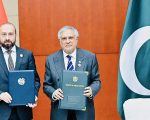WASHINGTON (APP) – Secretary of State John Kerry will visit the Arctic Circle next week for key ministerial talks on climate change amid global concerns about rising seas and accelerating ice melt.
Global warming is happening twice as fast in the Arctic than elsewhere on the planet and many fear not only devastating impacts of warming but also from an influx of people and industry on the pristine environment, wildlife and Inuit culture.
Kerry will attend a meeting of the Arctic Council in the northwestern Canadian town of Iqaluit, on Baffin Island.
The United States on April 24 formally takes over the two-year rotating membership of the intergovernmental forum – comprising countries with territory within the Arctic – Canada, Denmark, Finland, Iceland, Norway, Russia, Sweden and the United States.
The body aims to promote cooperation on environmental protection, as well as to help govern oil and mineral exploitation, shipping, tourism and fishing.
America’s priorities as the incoming chairman of the body “include addressing the impacts of climate change, Arctic Ocean safety, security and stewardship and improving economic and living conditions for people in the Arctic,” said acting State Department spokeswoman Marie Harf.
The meeting comes only months before December’s UN climate talks in Paris aimed at drawing up a new international pact to peg global warming to 2 deg C over pre-industrial levels.
It comes amid further bad news for the Arctic after US officials last month said the Arctic sea ice had reached its lowest winter point since satellite observations began in the late 1970s.
Among major carbon emitters, the United States, the European Union and Russia have already put their positions on the table for the Paris talks, with the US vowing a reduction of 26-28 per cent in its emissions of greenhouse gases by 2025 compared to 2005 levels.
Rising temperatures have boosted international interest in the polar region, as melting ice opens up shipping routes and makes hitherto inaccessible mineral resources easier to exploit.
Sarfraz Ali
The writer works as lifestyle Reporter for Daily Pakistan. He can be reached at sarfraz1168@gmail.com.
















